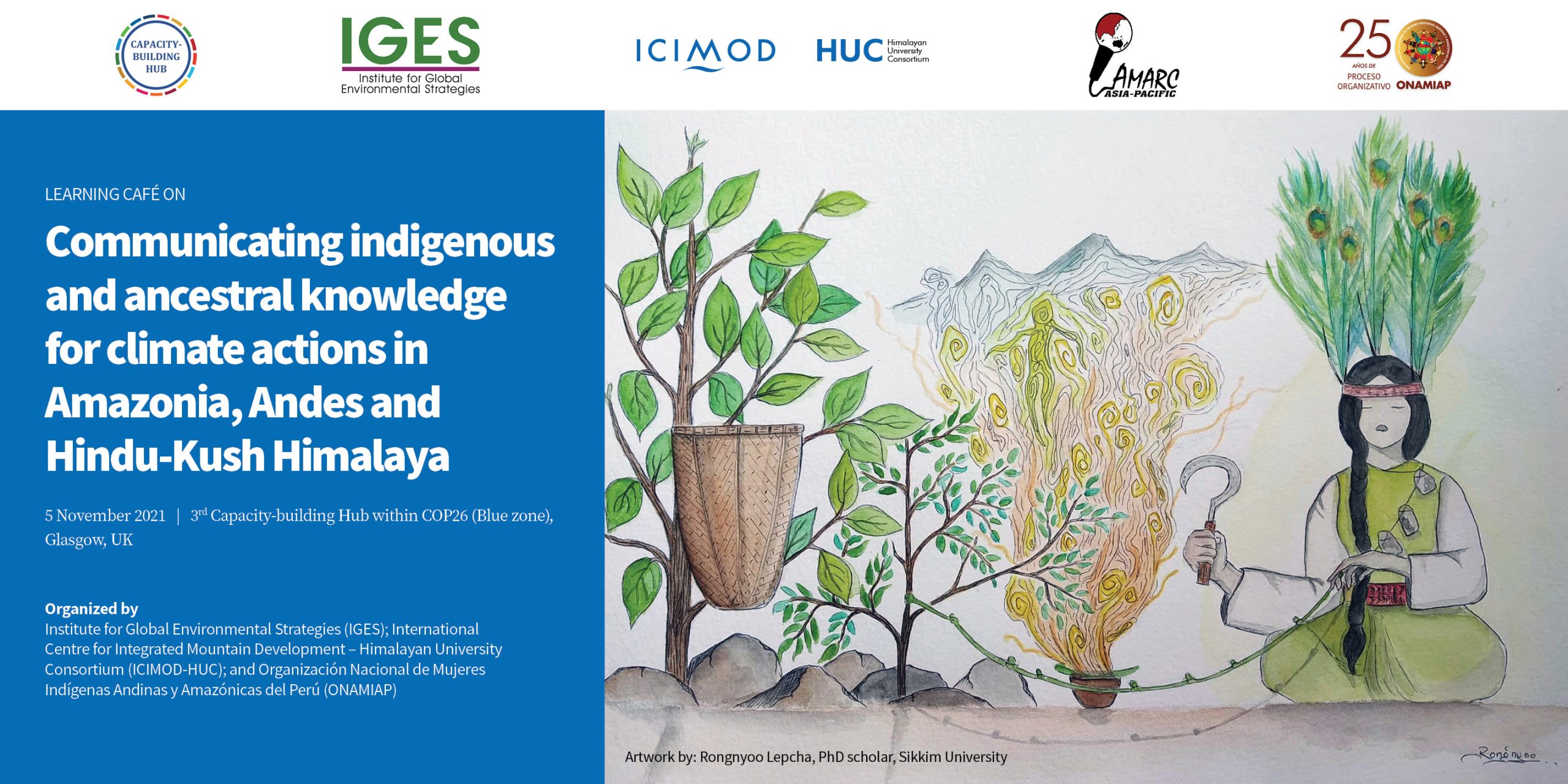Background
This learning café foregrounds the communication issues around indigenous and ancestral knowledge in the Andes, the Amazon, and the Himalaya to ensure that they are recognized and fully incorporated into state policies and actions in the fight against climate change. Through this session, we seek to bring greater recognition of the efforts of indigenous peoples towards sustainability, adaptation, co-existence with nature, stewardship, and conservation.
Objectives
- Exchange successful experiences in climate change adaptation through the application of indigenous and ancestral knowledge, wisdom, science, and technology promoted in the Andes, Peruvian Amazon, and Hindu Kush Himalaya (HKH).
- Present common challenges of indigenous peoples and women in the face of climate change in Latin America as well as Asia.
- Enhance awareness of the threats to the collective rights of indigenous peoples by the Peruvian state’s policies and norms, linked to the breakdown and dispossession of territories to prioritize activities that exacerbate the climate crisis. Propose the law of nature as a holder of rights and subject of protection.
- Introduce communication needs and innovative methods in communicating indigenous and ancestral knowledge for climate action at the local level.
Session structure
The session will focus on two themes: (1) experiences, challenges, and threats concerning indigenous and ancestral knowledge and rights in the Amazon, Andes, and HKH and (2) communication methods to promote indigenous and ancestral knowledge for effective climate action and to address issues.
Three ONAMIAP women leaders will share interventions on adaptation and mitigation that are being carried out in their respective territories and in the national context. Two of the speakers will communicate with supporting media material in their native language. English subtitles will be available.
Additionally, the ONAMIAP’s legal advisor will share the experiences of indigenous women from the perspective of the Peruvian national legal framework on climate change.
The session will shed light on how indigenous women in the Andean and Amazonian areas of Peru have been using their knowledge, science, and ancestral technology for climate adaptation and mitigation. We will also reflect on the policies and the internal regulatory framework that the Peruvian state has been implementing to break and dispossess territories in favour of third parties, thereby increasing and accelerating the climate crisis. In this context, we seek to evaluate the progress and challenges by presenting proposals that seek to resolve conflicts from the perspective of indigenous rights, the theoretical contributions of indigenous peoples about nature as a right holder and subject of protection, and intercultural dialogue.
The session will introduce a local-level communication strategy for the effective dissemination of indigenous and ancestral knowledge and technology, with a focus on developing compelling programmes for local radios, appealing to young local broadcasters using local indigenous language.
This will be followed by an introduction to how photography or art can improve indigenous women’s communication skills at a graphic level so that they can transmit indigenous knowledge and their demands in an effective way to decision makers, and thus contribute to the mitigation and adaptation to climate change.
This participatory dynamic is attractive for the participants because they will be able to learn or improve their ways of communicating, creating greater margins of action for when there are situations of risk, and the ability to have the rest of society as an audience, especially the scientific community and the government. On the other hand, it is attractive to the public because after generating that base of empathy during the café, they will see the interaction and graphic work of the participating indigenous women, seeing their messages first-hand. The session will be delivered in English and Spanish.
Programme
Speakers
| Name | Theme/title |
|---|---|
| Melania Canales, President, ONAMIAP | Political and social context of Peru and the work of ONAMIAP in the area of climate change |
| Mayra Macedo, OCIDMUSHI- ONAMIAP | Experiences of indigenous women to help mitigate and adapt to climate change |
| Karen Huere, OMIASEC- ONAMIAP | Experiences of indigenous women to help mitigate and adapt to climate change |
| Zulma Villa, Legal advisor, ONAMIAP | Threats to indigenous peoples rights and challenges for the states in the face of climate change |
| Suman Basnet, President, AMARC-Asia Pacific | Creative methods for communicating indigenous and ancestral knowledge through community radios |
| Udayan Mishra, Knowledge Management and Networking Officer, ICIMOD | Expressing indigenous and ancestral knowledge through art and photography |
Moderators
| Name/Organization | Role |
|---|---|
| Chi Huyen Truong, Himalayan University Consortium (HUC) | Co-facilitating the session and setting the scene |
| Binaya Raj Shivakoti, Institute for Global Environmental Strategies (IGES) | Co-facilitating the session and setting the scene |

